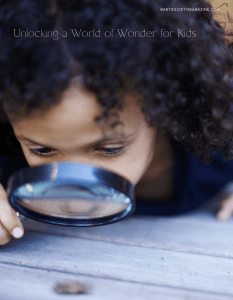By Yvonne Kai
Founder of Tiny Hikes & Adventures
From the day we brought our babies home, we are amazed by their infinite potential to become anything possible. Curiosity is a natural and innate trait that drives children to explore, learn, and understand the world around them. Touching things, pulling, ripping, scratching, poking, spilling … we need to let them do it. From asking countless questions to going on a swing belly first, children’s curiosity is a powerful force that fuels growth and development. Adventures are both external and internal, and the importance of curiosity benefits their overall learning experience.
Unlocking a World of Wonder for Kids
Curiosity is the catalyst for learning, igniting a child’s desire to acquire knowledge. It fuels their thirst for understanding, leading them to seek answers and solutions to various questions and problems. By encouraging curiosity, parents and educators can inspire children to engage in their learning journey actively, making education an exciting and fulfilling experience. Conversely, squashing their inconvenient, curious notions may do just the opposite. Be aware of how you react to your child’s curiosity. It may look like something else through tired parents eyes.
Critical Thinking Skills
When children are curious, they naturally develop critical thinking skills. Curiosity prompts them to analyze, evaluate, and think creatively, helping them make connections between different concepts and ideas. This ability to think critically equips children with problem-solving skills, allowing them to approach challenges with an open mind and find innovative solutions. This can be as simple as cause and effect and other concepts new to a person, the world, and their own bodies.
Growth Mindset
Curiosity nurtures a growth mindset, emphasizing the belief that abilities and intelligence can be developed through effort and perseverance. When children are curious, they embrace challenges, view mistakes as learning opportunities, and persist in facing setbacks. This mindset fosters resilience, self-confidence, and a love for lifelong learning. Age-appropriate challenges are worth learning! Every time something is done for a small child, a chance to practice is taken away. Take the example of pouring milk into a cereal bowl. The first few times may be spills, but they will get it!
Discovery Through Experiences
Curiosity drives children to explore their surroundings and experiment with different ideas and possibilities. Parents and educators offer children the freedom to discover and learn through firsthand experiences by allowing them to follow their curiosity. This hands-on approach enhances their understanding of the world, instilling a sense of wonder and excitement. Providing your child with ample opportunity to explore safely with peers is paramount.
Curiosity encourages a passion for discovery and the pursuit of knowledge beyond traditional learning settings. It will inspire children to delve deeper into subjects they find interesting. Nurturing this passion enables children to become lifelong learners, constantly seeking new information and experiences.
Social and Emotional Skills
Finally, curiosity plays a crucial role in developing social and emotional skills. It encourages children to ask questions, actively listen to others, and engage in meaningful conversations. By being curious about different cultures, perspectives, and ideas, children develop empathy, tolerance, and respect for diversity. Empower your children and unlock a world of possibilities for our tiny friends.

